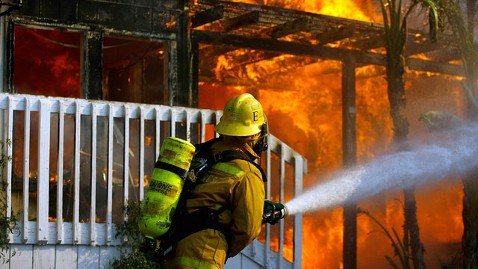Fire Safety: 7 Life-Saving Preventive Measures

David McNew/Getty Images
A devastating house fire killed three young girls and their grandparents early Christmas morning in Stamford, Conn. The three-alarm fire engulfed the Victorian home and tore through the upper floors.
It is a tragedy all too common during this time of year. Most homes built since the 1980s burn up to six times faster than older homes because they are made with synthetic materials that are cheaper and sturdier, but also more flammable.
Fire officials advise that if the smoke detector is sounding and it takes more than a cup of water to put out the blaze the fire fighting should be left to the professionals.
However, the most important action families can take happens well in advance of any fire. ABC News spoke with Jim Bullock, a retired deputy chief from the New York City Fire Department and owner of NY Fire Safety Institute; here are the seven preventive measures he recommends every family take.
1. Have a Plan Every family should have an evacuation plan and a designated meeting place to go after leaving the house. If the home has more than one story, each room should have a way to reach the ground without having to use the stairs; for many rooms rope ladders may be necessary.
2. Put Smoke Detectors Outside Bedrooms Smoke detectors should be placed in the hallway outside of the bedrooms because they will be triggered sooner, allowing for more evacuation time. If the bedrooms are located in different areas of the house or on a particularly long hallway multiple smoke detectors may be needed. It is also vital that smoke alarms are checked regularly to verify they are operational. For families with young children it's important to have a smoke detector where the mother is able to record her voice as the alarm. According to Bullock, studies have shown that young children often do not wake up to a normal smoke alarm or one that speaks in a voice they do not recognize and trust.
3. Shut Bedroom Doors at Night Every bedroom door should be closed a night. In case of a fire that simple step slows the speed at which the smoke and poisonous gasses enter the rooms.
4. Use Candles Infrequently Open flames start the most house fires. Candles burn at 1,000 degrees and if one ignites a blanket or pillow within three or four minutes an entire room can be consumed by flames. Bullock recommends using electronic candles instead.
5. Place Fire Extinguishers in Areas with Open Flames In most houses, fire extinguishers should be placed in the kitchen and the boiler room, or any area with an open flame. If one of the residents of the house smokes, an extinguisher should be placed in the room where that person smokes the most. It is important the adults in the house know how to properly use the extinguisher prior to a fire.
6. Throw Away Christmas Trees After Christmas Christmas trees become extremely dangerous when they dry out and should be disposed of as soon as that happens. A tree can set an entire room on fire in three to four minutes. Bullock said fire officials say Christmas trees are "like a gasoline can in the middle of your living room."
7. Extension Cords Are Temporary Extension cords are intended for temporary use only, if a permanent solution is needed, rewire and add an outlet in the place it is needed. Additionally, do not connect multiple extension cords or power strips together.
ABC News' Matt Gutman contributed to this report.